The one-word argument against the European Super League is that it is ‘unfair.’ For this argument to have any sway, things should be ‘fair’ the way they are. Are they?
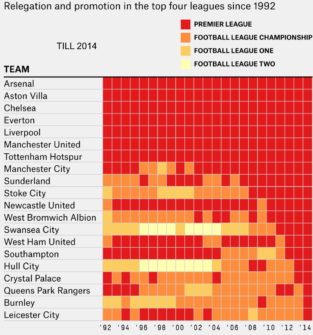 To explore this argument, let us look at the clubs from the Premier League that had agreed to be part of the European Super League (ESL). The common thread between these clubs is that they have never been relegated in the Premier League era. The competition might have been fair in the nineties. However, since the turn of the century, the single biggest determiner of success in the league is: Money. All six clubs are money rich. The others are also-rans, relegation prone. Indeed, you will find a Bolton, Bournemouth, Portsmouth, a Wigan, or a Stoke City, that will have a decent run for a few years. However, the moment they show ambition. The moment they crack the top eight, they inevitably slide. Is this fair?
To explore this argument, let us look at the clubs from the Premier League that had agreed to be part of the European Super League (ESL). The common thread between these clubs is that they have never been relegated in the Premier League era. The competition might have been fair in the nineties. However, since the turn of the century, the single biggest determiner of success in the league is: Money. All six clubs are money rich. The others are also-rans, relegation prone. Indeed, you will find a Bolton, Bournemouth, Portsmouth, a Wigan, or a Stoke City, that will have a decent run for a few years. However, the moment they show ambition. The moment they crack the top eight, they inevitably slide. Is this fair?
Why does this happen? One reason is poaching from the top clubs. If any player from these clubs (let’s call them the bottom ten) shines and outperforms, they are poached by the top clubs. The Van Dykes, Mahrezes, Kantes of the league end up playing for the top six clubs. Critically analyzed, the role of the bottom ten clubs is to be feeder lines for the top six. So that the top six can go and win the accolades. The top six can compete with the ‘elite.’ Isn’t the ESL an affirmation of this elite?
In this regard, all leagues are the same. In the so-called peoples league of Germany, every skilled footballer ends up at Bayern.
Can the Premier League or the UEFA stop this? Rather, will they stop this? More appropriately, do they have the will to stop this?
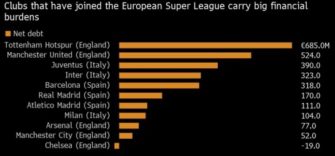 If we explore this financial aspect of the ‘elite’ clubs. There are two kinds of ESL clubs, one kind which are funded by multi-billionaire owners, and the other financed by multi-million euro debts. Either way, they are living off more than that they earn. This can be done in the short term; however, this is simply not sustainable in the long term. Billionaires are billionaires because they have a good business sense. And, eventually, they would like to see a return on investment. Corporations running million-dollar debts eventually find ways of removing the debt from their balance sheets. This is either by way of profit, or, by way of bankruptcy, or asset sale. These clubs need revenues and a lot of it.
If we explore this financial aspect of the ‘elite’ clubs. There are two kinds of ESL clubs, one kind which are funded by multi-billionaire owners, and the other financed by multi-million euro debts. Either way, they are living off more than that they earn. This can be done in the short term; however, this is simply not sustainable in the long term. Billionaires are billionaires because they have a good business sense. And, eventually, they would like to see a return on investment. Corporations running million-dollar debts eventually find ways of removing the debt from their balance sheets. This is either by way of profit, or, by way of bankruptcy, or asset sale. These clubs need revenues and a lot of it.
In this scenario, ESL makes business sense, as it guarantees revenues. So all those cheering the cancellation of ESL, beware. ESL in some form or the other is a reality that will happen. “It is just business.”
If you truly want to stop the ESL, then you should destroy the business case for it. One way of doing it is to make clubs profitable. Usually, this can be done by increasing revenues or by decreasing expenses. In football, we are almost at peak revenues. If things come to normal next year, at most stadium receipts will bring in a revenue stream. Other than that, there is nothing much that can be done.
On the other hand, on the expenses side, many things can be done. The absolute best way of reigning in expenses is: introducing a salary cap. All the players who made a huge hue and cry over the ESL should sign up for a salary cap. Will they? We will get to the hypocrisy later.
Even the loud coaches who opposed the ESL in a muted tone should also agree to wage caps. The least they can do is make public the remuneration contracts of players and staff. This way, the public that opposed the ESL can understand the root of the problem. Will this happen?
Transparent salary caps will bring fairness to the system; the bottom clubs will be able to better hold on to their players.
 Talking about wage bills and fairness, a slight digression here. Every Christmas period, we hear the top managers in the league moan about fixture scheduling and injuries. You know what, the most affected by this are the bottom clubs. With their bloated wage bills, the top clubs have excessive bench strength, they can compensate for their injuries. After Van Dyke’s injury, Liverpool does not become relegation prone. However, with a Zaha injury, Crystal Palace ends up dangerously close to the relegation zone. Again is this fair?
Talking about wage bills and fairness, a slight digression here. Every Christmas period, we hear the top managers in the league moan about fixture scheduling and injuries. You know what, the most affected by this are the bottom clubs. With their bloated wage bills, the top clubs have excessive bench strength, they can compensate for their injuries. After Van Dyke’s injury, Liverpool does not become relegation prone. However, with a Zaha injury, Crystal Palace ends up dangerously close to the relegation zone. Again is this fair?
Anyways, back to ESL. Isn’t the ESL the logical conclusion of the footballing structure created in the last three decades? That is why, I feel, it is an eventuality. Today canceled, tomorrow celebrated. It is about revenues. And, revenues are driven by television rights. And, elite clubs drive television money. I have maintained that Asia’s broadcasting rights are the right barometer for television money. In India, obscure channels like Neo sports, Nimbus, etc., broadcast Italian, Spanish, and German Leagues. It is a crude direct feed, without any pre or post-show. I am not sure which channel broadcasts the French League. The top channels, Star and Sony, host the Premier League and Champions League, respectively. The setup is more elaborate, with pre and post-game shows, midweek fan-zones, and some game analysis shows. On the app Hotstar, you can see the number of people watching online. For a marquee match between Man City and Man United, the numbers easily reach seven or eight million. Whereas a Leeds and West Ham match barely manages ten thousand. This is incredibly concerning for the Premier League. Some of its games go unnoticed.
However, the more significant concern for the clubs is when a Man City and West Ham match manages barely two lakh (two hundred thousand) viewers. From a revenue maximization point of view, this is wasteful. Even when the league position is at stake, the viewership does not rise. The reason, the viewer wants to invest time only if they can watch quality matchups.
 You might dispute the footballing credentials of Ed Woodward, but you cannot question his revenue skills. A club that has not been a credible contender for a decade manages to regularly sign hundred million dollar players. All because of the revenue streams. And he understands one thing, making your prized assets (players) perform in obscure matches is revenue wasting and risky (injury-wise). Ideally, they should play fewer matches, marquee fixtures, and maximize potential. And like I said previously, viewers want the same.
You might dispute the footballing credentials of Ed Woodward, but you cannot question his revenue skills. A club that has not been a credible contender for a decade manages to regularly sign hundred million dollar players. All because of the revenue streams. And he understands one thing, making your prized assets (players) perform in obscure matches is revenue wasting and risky (injury-wise). Ideally, they should play fewer matches, marquee fixtures, and maximize potential. And like I said previously, viewers want the same.
And, all this nostalgia about football tradition, the significance of the Premier League is hypocrisy at its best. What happened to the rich tradition of the FA Cup? Isn’t the tournament more of an inconvenience for the top teams? Don’t B or C sides play the FA Cup?
The Losers in this fiasco.
The biggest losers in this fiasco are the teams that were in the twelve because of historical brand value and not on current form. The Arsenals, the Spurs, the Milan clubs, the Athletics are the real losers. This was their chance for automatic elitism and guaranteed valuation. For some, qualifying for the champions league is a dream; winning the champions league is not something they can even dream about. This was their chance to cement themselves as the permanent elite. Honoring their legacy. Seriously, when is the next time Arsenal can think of facing Real Madrid ? A pre-season friendly !
Where did the ESL go wrong?
The ESL went wrong in their media management. I always say look at Cricket for media management. One trick that the owners of the elite clubs can pick from the Cricket pages is to add a clause in the next round of broadcasting negotiations. The clause of controlling access to media. The club will decide which pundit can interview them post-match, get access to its managers and players. All this free trolling of the Glazers, the Kroenke’s, of David Dein, will stop. The pundits will go head over heels for the clubs.
Manchester United owners have consistently pumped eighty to hundred million in each transfer window. Still, every pundit accuses them of mismanaging the club. If the owners micromanage every decision, like at Newcastle, then they are interfering with the football. If they maintain a hands distance from the activities of the club, they are uncaring and aloof. A manager is always sacked either too soon or too late. The Whole Punditry is the television version of internet trolling.
The ESL went wrong because they did not declare what will they do with the television rights. The current right holders, some of whom have contracts up to 2025, naturally began defending their investments. Having early kick-offs to ensure a wider worldwide audience does not interfere with footballing tradition. It is just an ‘evolution of the sport. Similarly, the ESL should have approached the current television right holders with the possibility of hosting the new league on their channels. The ESL would have been termed as the ‘natural evolution of the sport.
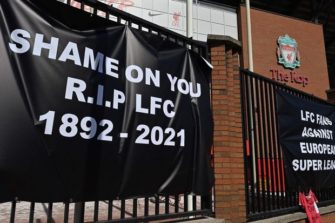 The second misstep of the ESL was not making their fans aware of the dire financials of their clubs. One declaration that if the ESL does not come through, then there will be no signings for the next few seasons. Or that ticket prices will rise by fifty percent, or some marquee players will be offloaded. Boom, all the fans would have wanted the ESL and rose up against the exploitative UEFA. Ever wondered, Why after so many defensive injuries, Liverpool did not sign a quality defender in the winter!
The second misstep of the ESL was not making their fans aware of the dire financials of their clubs. One declaration that if the ESL does not come through, then there will be no signings for the next few seasons. Or that ticket prices will rise by fifty percent, or some marquee players will be offloaded. Boom, all the fans would have wanted the ESL and rose up against the exploitative UEFA. Ever wondered, Why after so many defensive injuries, Liverpool did not sign a quality defender in the winter!
There are several other things the ESL could have done better, but then, they have lost their first attempt. No use in having a post mortem over it.
What will happen?
Ideally, again taking a page from Cricket, the powers that be, co-opt the ESL idea. Indian Cricket League (ICL) did not take off; however, the board saw the writing on the wall, co-opted the idea, and the Indian Premier League (IPL) was born. Today, a bottom-of-the-league, dead rubber between IPL teams gets more viewership than a South Africa v New Zealand. After struggling with the IPL for a few years, International Cricket gave up. Today, a nice slot is made in the international calendar for the IPL. Even when the IPL is rescheduled due to some issues, the international calendar is adjusted.
The other way it can go is the way automobile brands went. All the top brands of the eighties and nineties, all of them with pedigree and decades of history, fell foul of the market forces. Some of them became literal brands – ‘A Badge of paper.’ Today, some manufacturers in country C operate the brand, exporting it to country B. In all this, country A, where the brand was originally from, has no role to play whatsoever.
Some may survive, some will perish, and some will become paper tigers. The market is brutal in that sense. It might forget a bad reputation, but the market never forgets a bad debt. In most cases, we will see an asset sale. It will begin with the players and eventually move on to the tangible assets like Stadiums, training grounds. And like any other corporation in such a situation, the owners will make up their invested money. The banks will take a bit of the hit. Some debtors may lose depending on their size: small debtors will lose the most. But, the most pain will be felt by the emotional supporter.
It is like the financial crisis of 2008; big banks caused it by excessive leveraging, small businesses and professionals paid the price with the economic downturn. Similarly, Big Clubs are excessively leveraged, a crisis will ensue, and it will be felt the most by the small clubs. The Top clubs will ‘restructure’ and resume with something akin to the ESL.

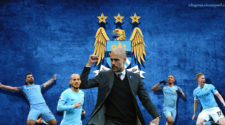








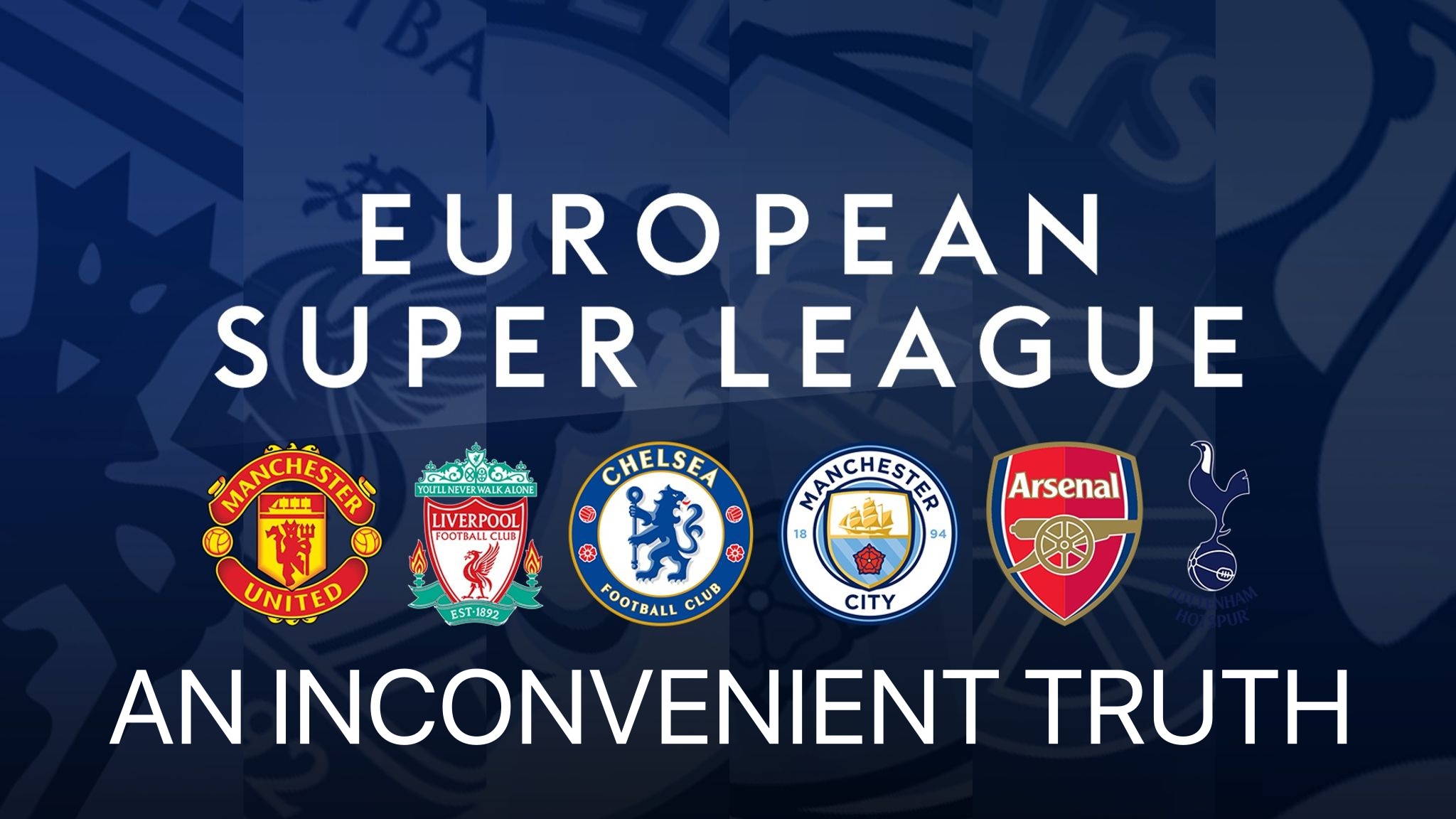
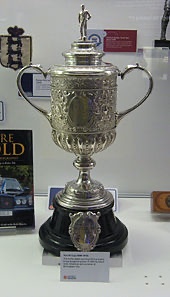



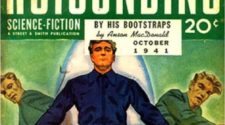

No Comment